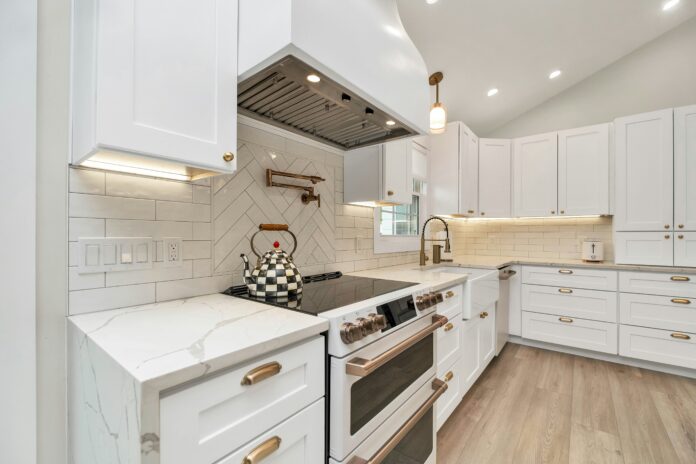How to Choose the Perfect Slab for Your Home
Discover the top 9 kitchen countertop materials, including granite, quartz, marble, and more. Learn how to choose the best slab based on your budget, durability, maintenance, and style preferences. Whether you’re renovating or building a new kitchen, this guide helps you find the perfect countertop material to enhance your home’s functionality and aesthetic appeal
1. Granite
- Pros:
- Natural stone with unique patterns.
- Very durable and resistant to heat, scratches, and stains (when sealed properly).
- Adds value to your home.
- Cons:
- Requires periodic sealing to maintain resistance to stains.
- Can be expensive.
- Best For: Homes where durability and aesthetics are equally important, and maintenance is not an issue.
2. Quartz (Engineered Stone)
- Pros:
- Non-porous and doesn’t require sealing.
- Highly resistant to stains and scratches.
- Comes in a wide range of colors and patterns.
- Cons:
- Less heat-resistant than granite.
- Can be more expensive than some natural stones.
- Best For: Busy kitchens where low maintenance is a priority, and consistent patterns are preferred.
3. Marble
- Pros:
- Classic, luxurious appearance with natural veining.
- Cool surface, ideal for baking.
- Cons:
- Prone to scratches, stains, and etching from acidic substances.
- Requires regular sealing and maintenance.
- Best For: Homes where the aesthetic appeal is paramount, and maintenance is not a major concern.
4. Laminate
- Pros:
- Affordable and available in a wide variety of designs, including those that mimic stone and wood.
- Easy to install and maintain.
- Cons:
- Less durable, can be damaged by heat and sharp objects.
- Cannot be repaired easily if damaged.
- Best For: Budget-conscious renovations and rental properties.
5. Solid Surface (e.g., Corian)
- Pros:
- Non-porous, easy to clean, and repairable.
- Seams are nearly invisible.
- Available in many colors and patterns.
- Cons:
- Can be scratched or scorched by heat, though minor damage can be buffed out.
- Not as resistant to heat as stone options.
- Best For: Modern kitchens where seamless design and easy maintenance are important.
6. Butcher Block (Wood)
- Pros:
- Warm, natural look that adds character.
- Can be sanded and refinished to remove scratches.
- Cons:
- Requires regular sealing to protect from water damage.
- Prone to scratches and dents.
- Best For: Rustic or farmhouse-style kitchens, or those who prefer natural materials.
7. Concrete
- Pros:
- Highly customizable in terms of shape, color, and texture.
- Durable and heat-resistant.
- Cons:
- Prone to cracking if not properly installed or maintained.
- Requires regular sealing to prevent staining.
- Best For: Modern, industrial-style kitchens where a custom look is desired.
8. Stainless Steel
- Pros:
- Durable, heat-resistant, and hygienic.
- Offers a sleek, modern look.
- Cons:
- Can scratch and dent easily.
- Shows fingerprints and smudges.
- Best For: Professional-style kitchens where hygiene and durability are top priorities.
9. Soapstone
- Pros:
- Heat-resistant and doesn’t require sealing.
- Develops a unique patina over time.
- Cons:
- Softer than granite or quartz, so it can scratch or dent more easily.
- Limited color options, usually in darker shades.
- Best For: Traditional or country-style kitchens where natural aging and a softer aesthetic are appreciated.
How to Choose:
- Consider Your Budget:
- Determine how much you’re willing to spend. Materials like granite, quartz, and marble are on the higher end, while laminate and solid surface materials are more affordable.
- Think About Durability:
- Consider how much wear and tear the countertop will endure. If you cook frequently and use your kitchen heavily, opt for durable materials like granite, quartz, or solid surface.
- Maintenance:
- Some materials require more upkeep than others. For low-maintenance options, quartz and solid surface are good choices. Natural stones like granite and marble need sealing, while wood needs regular oiling.
- Aesthetic Appeal:
- Choose a material that complements your kitchen design. Marble and granite offer a luxurious look, while butcher block provides a warm, rustic feel.
- Lifestyle:
- Consider your lifestyle and how you use your kitchen. For example, if you bake a lot, marble’s cool surface might be appealing. If you need a hygienic surface, stainless steel could be ideal.
- Resale Value:
- If you’re planning to sell your home in the future, consider materials that add value, such as granite or quartz.
By balancing these factors, you can choose a countertop material that fits your needs and enhances the beauty and functionality of your kitchen.



